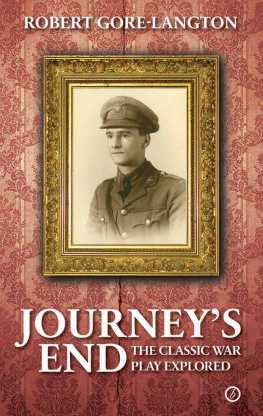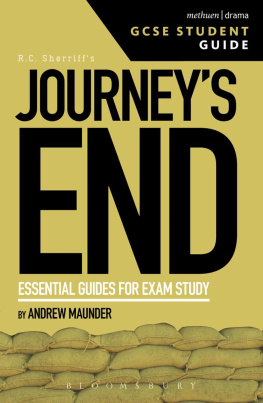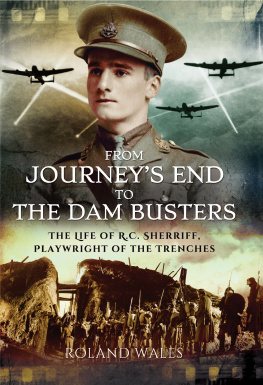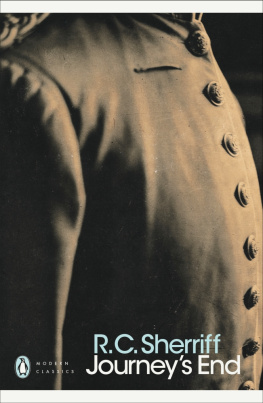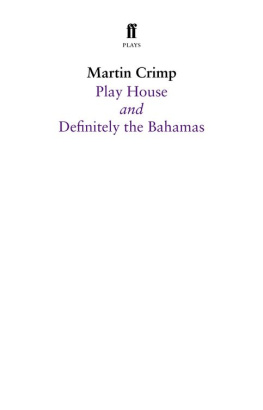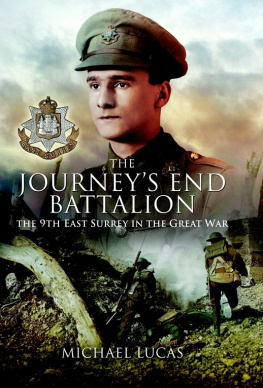
Second Lieutenant R.C. Sherriff, possibly in 1916, reproduced by permission
of Kingston Grammar School and The Surrey History Centre
Robert Gore-Langton
JOURNEYS END
THE CLASSIC WAR PLAY EXPLORED

OBERON BOOKS
LONDON
WWW.OBERONBOOKS.COM
First published in 2013 by Oberon Books Ltd
521 Caledonian Road, London N7 9RH
Tel: +44 (0) 20 7607 3637 / Fax: +44 (0) 20 7607 3629
e-mail:
www.oberonbooks.com
Copyright Robert Gore-Langton, 2013
Robert Gore-Langton is hereby identifed as author of this work in accordance with section 77 of the Copyright, Designs and Patents Act 1988. The author has asserted his moral rights.
You may not copy, store, distribute, transmit, reproduce or otherwise make available this publication (or any part of it) in any form, or binding or by any means (print, electronic, digital, optical, mechanical, photocopying, recording or otherwise), without the prior written permission of the publisher. Any person who does any unauthorized act in relation to this publication may be liable to criminal prosecution and civil claims for damages.
A catalogue record for this book is available from the British Library.
PB ISBN: 978-1-84943-395-2
E ISBN: 978-1-84943-872-8
Printed, bound and converted by CPI Group (UK) Ltd, Croydon, CR0 4YY.
Visit www.oberonbooks.com to read more about all our books and to buy them. You will also fnd features, author interviews and news of any author events, and you can sign up for e-newsletters so that youre always first to hear about our new releases.
For Grenville and Elizabeth
Contents
Bibliography
Acknowledgements
My biggest thank you is to my wife Sue, for putting up with the trenches and me. I am indebted also to the director David Grindley who couldnt have been more enthusiastic or helpful.
Sherriff was a generous benefactor of the Boy Scouts and his old school. I am grateful to the Scouts Association, to Kingston Grammar School and to Curtis Brown Group Ltd. London for their permission to quote from Sherriffs unpublished letters, papers and diary, his essay The English Public Schools in The Great War in Promise of Greatness (1968) edited by G. A. Panichas, No Leading Lady (1968) and the novel Journeys End (1930). The Society of Authors kindly gave permission on behalf of the Bernard Shaw estate to quote Shaws letter to RCS. The quotations from Journeys End come from the Penguin Classics playscript by permission of Penguin Books. Despite my best efforts, if I have not managed to trace any copyright holders I apologise for any unintended breach.
I owe thanks to Geoffrey Streatfeild, David Haig and other cast members of Journeys End who contributed (without fee) their thoughts and time to either the book, the radio project or both. I am grateful for the support of Nicola Beauman, publisher of Sherriffs novels and founder of Persephone Books. I also thank Major Richard Streatfeild for use of his blog post, Simon Hollis, Gen. Sir Michael Rose, Dr Michael and Annie Dixon, Max Arthur, Andrew Rissik, Angela Stockbridge, Julie Macpherson and David Twining-Harris. I also thank my fellow theatre critics who I have quoted.
Introduction
A t the time of writing, War Horse is still a huge hit. But Journeys End is unique in being the only Great War play by a veteran to have any longevity and the only one to be set entirely in a trench. This book comes out of an encounter with the play back in 2004. It hit me like a World War One whizzbang. What was so surprising was that despite being the most successful war play since Henry V nobody seemed to know anything about its author.
Annoyingly, Sherriffs autobiography leaves out his entire war experience. But I discovered what I could, made several trips to the Front (bumping into windswept parties of British schoolchildren doing Journeys End at GCSE) and a programme for Radio 4. David Grindley and his cast came into talk about the play.
Anyway, it left room for a longer story about the background to the play. That is what this book is an account of the front line context, the staging and the afterlife of a classic war play. It ends with a detailed look at the most recent West End production, the best since the first. I have not attempted a biography of Sherriff but the basic facts of his life are these: Robert Cedric Sherriff (1896-1975) was an insurance clerk from Hampton Wick (on the Thames) who joined up. He was commissioned into the 9/East Surrey Regiment as a second lieutenant and his active service in France was from the end of September 1916 to the beginning of August 1917 when he was wounded in the face at Passchendaele. He recovered in England and never returned to the front. Sherriff was demobbed in 1919 with the rank of captain and went back to his old firm as a loss adjuster in the Thames Valley.
He wrote several amateur dramas as fundraisers for his local rowing club in the mid-1920s. His final play was not for the
On paper it had nothing going for it no leading lady, no French windows or anyone for tennis. Worse, it was about the war and war plays were then considered a deadly snore by theatre managements. It was put on by the not for profit Stage Society in late 1928 with the young Laurence Olivier, before transferring to the Savoy Theatre early the following year with Colin Clive replacing him in the lead.
The show was wildly praised, became a huge box office smash in London. It was soon playing in twenty-six languages in most of the capitals in Europe; it was a hit in America, Australia and the far reaches of the Empire. It clocked up a record-breaking run of 593 performances in the West End and ended up as both a film and a novel. The published play sold 175,000 copies. It made Sherriff and his producer rich men. It also launched the career of the cult film director James Whale.
Rejecting the theatre, Sherriff decided to become a mature student with a view to schoolmastering. He went up to Oxford but abandoned his History degree for a Hollywood contract to write the screenplay for The Invisible Man. He became a highly successful jobbing screenwriter and a bestselling novelist. His fiction masterpiece was The Fortnight in September (1931) and his films in the late Thirties and Forties included Goodbye Mr Chips, The Four Feathers, Lady Hamilton, Mrs. Miniver and Odd Man Out among others. His screenwriting career ended with The Dam Busters in 1955. He died in 1975 at the age of seventy-nine, by then totally forgotten.
Today his name rests on his war play. They say a lot of war poetry is love poetry in disguise. Certainly Journeys End is rooted in love. The one big affair of Sherriffs life was with C Company of the 9/East Surrey. His play reflects his extraordinarycompassion for the men he served alongside. His play doesnt ask what the war meant: Will you take apricots, sir is about its most probing question. But it reflects the intense brazier glow of the comradeship he never forgot.
Sherriffs entry in biographical dictionaries states that he won the Military Cross. He didnt. In fact he was not naturally very courageous. His ten and half months in France was plagued by constant fear fear of shells and a fear of failing to do his job properly. He tried desperately like all the other schoolboys in uniform to be brave. He underwent some sort of crisis in the spring of 1917.

